A really diverse group gathered Wednesday evening to reflect on Brian McLaren’s lectures. The breadth of viewpoints and backgrounds made for a great conversation. Thanks to everyone who came out.
Dave Fitch spent some time re-presenting a piece of Brian McLaren’s lecture from earlier in the day that dealt with possible responses of the church to globalized capitalism. Dave outlined how historically the church has existed through several shifts in the world: (I wish I had a cool diagram like Mike, but you'll just have to imagine).
- In Medieval times, the church was the main power in the world, and states functioned within the realm of the church’s existence and power.
- In Modern times, the nation/state was the main power in the world, and the church functioned within the realm of the state’s power.
- In Postmodern times, the Theocapitalist Empire (McLaren’s term) is the main power in the world, and both the state and the church function within the realm of its power.
The Theocapitalist Empire represents, of course, multinational corporations who intentionally shape culture (particularly youth culture) and spend massive amounts of money and energy in politics. But it also represents the larger (and smaller) systems and subsystems of global capitalism that influence the world profoundly in terms of lifestyles, values, personal aspirations, family systems, international politics, and the list goes on and on.
The three negative responses of the church in such a setting according to McLaren are:
- Dominance-Empire: The church seeks to influence those in power or gain power. Think Dobson or Falwell in relation to the nation state, and all the corporate mimicking and emphasis on successful CEOs, efficiency, and size in relation to the Theocapitalist Empire.
- Revenge-Victimhood: Think terrorism. Shooting abortion doctors. You get the point.
- Isolation-Abandonment: The church isolates itself, abandoning the larger culture. (Isn’t it helpful to use all the same words in the definition? I thought that one seemed pretty self-explanatory.)
Our discussion tried to address our “Now what?” response to these ideas. We shared our impressions of our own churches, and discussed what a fourth, “Kingdom” alternative would look like in our own settings, living between dominance and isolation in the subverting way of life shown to us and enabled in us by Jesus. Through a lot of great conversation, I came away very aware of how much thoughtful and critical reflection is necessary to identify and address the shaping forces we find ourselves living within.
So I pass on the conversation to the rest of you. What negative response does your own church lean toward or struggle with? How can we resist the shaping forces of global capitalism in our own lives and the lives of those in our churches without seeking dominance, revenge or isolation? Perhaps as an entryway into that huge question, what do you identify as the shaping forces of capitalism in your life and the life of your church?
Because knowing is half the battle! (G.I. J-nevermind.)
Blessings!
Jon Berbaum
-up/rooted.north coordinator

 Don't forget, our next
Don't forget, our next 
 Make sure to mark your calendars, because on
Make sure to mark your calendars, because on